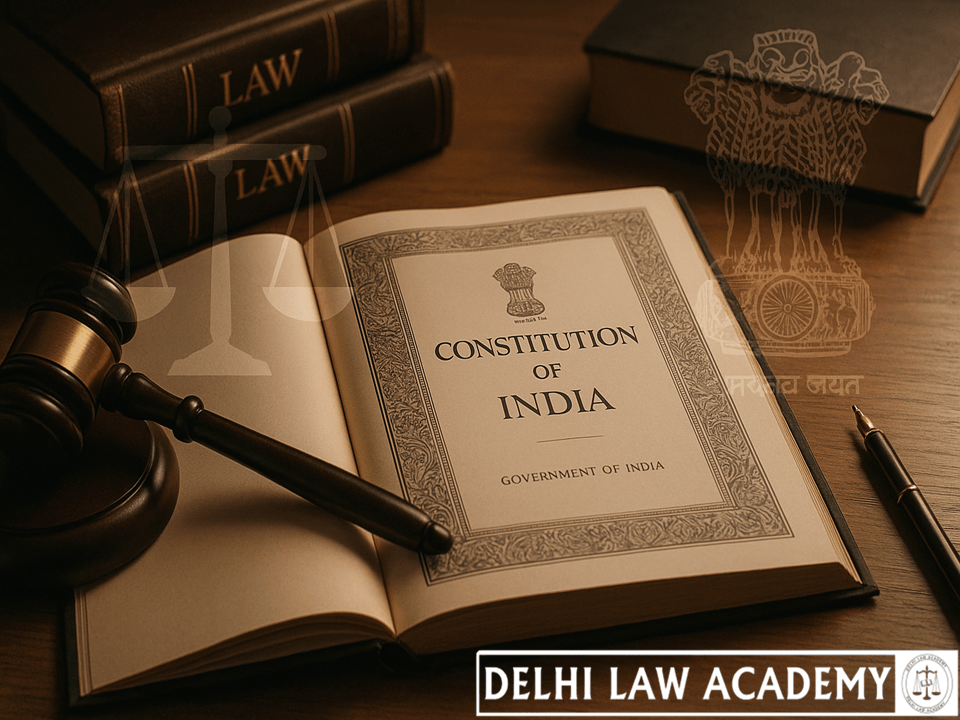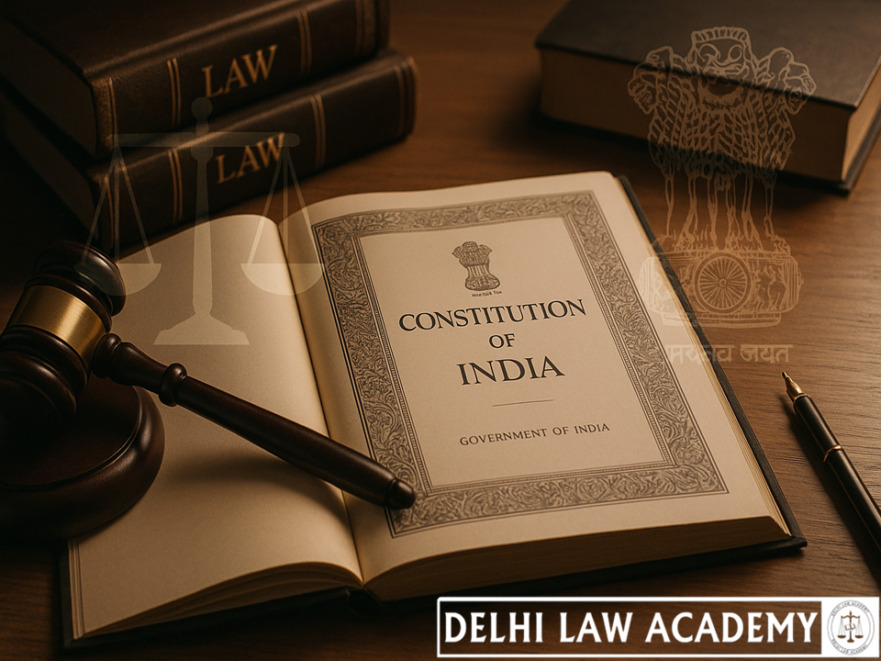
📌 Key Topics in This Blog
- Definition and scope of “State” under Article 12 🏛️
- Supreme Court interpretations of “State” from 1967-2005 ⚖️
- Scope and significance of the term ‘Law’ in Article 13 📜
- Landmark cases: Shankari Prasad, Golaknath, Keshavanand Bharti ⚖️
- Protection of Fundamental Rights from State actions 🛡️
- Constitutional amendments and the Basic Structure Doctrine 🏛️
📜 Fundamental Rights: Articles 12 & 13 Explained | DLA Jaipur
Delhi Law Academy Jaipur presents below for aspirants of RJS, DJS, PCS(J) and other Judicial Services throughout India a short note on Articles 12 and 13 of the Constitution, elucidating the scope and significance of the term ‘Law’ in Article 13 and scope of the term “State” in Article 12 as expanded by the Supreme Court from 1967 onwards.
📌 Scope and Significance of the Term ‘Law’ in Article 13
Article 13 Clause (3)
- Law in this Article includes: ordinance, order, by-law, rule, regulation, notification, custom or usage having the force of law
Supreme Court on the scope and significance of the term ‘Law’ in Article 13:
Case 1: Shankari Prasad v. Union of India [1951 SC]
- “Although ‘law’ must ordinarily include constitutional law, there is a clear demarcation between ordinary law, which is made in exercise of legislative power, and constitutional law, which is made in exercise of constituent power.”
- “In the context of article 13, ‘law’ must be taken to mean rules or regulations made in exercise of ordinary legislative power and not amendments to the Constitution made in exercise of constituent power, with the result that article 13(2) does not affect amendments made under article 368.”
- “The terms of article 368 are perfectly general and empower Parliament to amend the Constitution, without any exception whatever. Had it been intended to save the fundamental rights from the operation of that provision, it would have been perfectly easy to make that intention clear by adding a proviso to that effect.”
Case 2: Golaknath v. State of Punjab [1967 SC]
- Whether a Constitutional Amendment is a “law” within the meaning of Article 13(2)?
- A constitutional amendment under Article 368 of the Constitution was an ordinary ‘law’ within the meaning of Article 13(2).
- Since according to Article 13(3), Parliament could not make any law that abridges the Rights contained in Part III, a constitutional amendment, also being an ordinary law within the meaning of Article 13, could not be in violation of the fundamental rights.
- The Supreme Court overruled its earlier decision in Shankari Prasad v. Union of India [1951].
Subsequent development:
- 1971: 24th Amendment inserted Clause (4) to Article 13 – “This article shall not apply to amendments under article 368”
- Case 3: Keshavanand Bharti v. State of Kerala [1973 SC] – Parliament could amend any provision of Part III but not the Basic Structure of the Constitution.
🛡️ Protection Against Whom?
Article 13 protects Fundamental Rights from violative actions by the “State”.
Definition of ‘State’ (Article 12)
- Government of India, Parliament of India
- Government of each State, Legislature of each State
- All local authorities in India, Other authorities in India or under control of Govt of India
Scope of the Term “State” as Expanded by the Supreme Court:
Case 1: 1967 – Rajasthan SEB v. Mohan Lal
- The Electricity Board, a corporation under statute for commercial activities, is included as “State”.
Case 2: 1975 – Sukhdev Singh v. Bhagatram Raghuvanshi
- Public corporations with statutory duties for public benefit are included as “State”.
Case 3: 1981 – Ajay Hasia v. Khalid Mujib Sehravardi
- College established by a registered society is within the definition of “State”.
Case 4: 1981 – Som Prakash Rekhi v. Union of India
- Bharat Petroleum Corporation held to be a “State”.
Case 5: 2002 – Pradeep Kumar Biswas v. Indian Institute of Chemical Biology
- CSIR held as a “State” due to control by central government.
Case 6: 2005 – Zee Telefilms v. Union of India
- BCCI was not considered a “State”.
📚 Continue Your Constitution of India Preparation
Don’t stop here! Strengthen your knowledge of the Fundamental Rights with our other related blogs:
📘 Stay Ahead with Delhi Law Academy!
Get access to free monthly current affairs, read our insightful blogs,
and explore free study resources prepared by experts at DLA Jaipur. 🚀
❓ Frequently Asked Questions | Articles 12 & 13
Article 12 defines “State” to include:
- Government of India, Parliament of India
- Government of each State, Legislature of each State
- All local authorities in India, Other authorities in India or under control of Govt of India
The Supreme Court has included statutory authorities and public corporations performing public duties, e.g.:
- Rajasthan SEB (1967) – Electricity Board included as “State”
- Sukhdev Singh v. Bhagatram Raghuvanshi (1975) – Public corporations with statutory duties
- Ajay Hasia (1981) – Registered societies performing public functions
- Som Prakash Rekhi (1981) – Corporations like Bharat Petroleum
- Pradeep Kumar Biswas (2002) – CSIR as “State” due to central government control
- Zee Telefilms (2005) – Not considered a “State”
“Law” under Article 13(3) includes:
- Ordinance, order, by-law, rule, regulation, notification
- Custom or usage having the force of law
Supreme Court decisions:
- Shankari Prasad (1951) – Amendments under Article 368 not covered as ‘law’
- Golaknath (1967) – Constitutional amendments are ‘law’ under Article 13(2)
- 24th Amendment (1971) – Article 13(4) clarified that amendments under Article 368 are excluded
- Keshavanand Bharti (1973) – Parliament can amend Part III but cannot alter Basic Structure
Article 13 declares that:
- All pre-Constitutional laws inconsistent with Fundamental Rights are void
- All post-Constitutional laws violating Fundamental Rights are void to the extent of inconsistency
- This ensures legislative and executive actions do not infringe Fundamental Rights
Yes, if the entity performs public functions or is controlled by the government, as established in:
- Ajay Hasia (1981) – College run by society
- Pradeep Kumar Biswas (2002) – CSIR controlled by central government
- Concept: Public or statutory duties + government control = may be treated as “State”
Contact us
📍 Delhi Law Academy – Jaipur Branch
6C, Tower 2, Coaching Hub, Pratap Nagar, Jaipur – 302033
📞 Phone:
+91 9911916552
+91 8447285606
✉️ Email:
contactus@delhilawacademy.com

